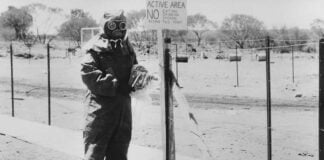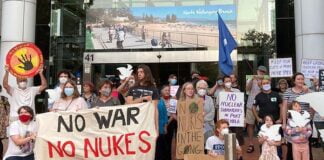Review: Muqtada Al-Sadr and the Fall of Iraq
By Patrick Cockburn, Allen and Unwin $29.95
BY A strange coincidence the place where the first US soldier was killed by a roadside bomb in Iraq was also the scene of a battle against British soldiers in 1920 as they advanced towards Fallujah—to inflict “heavy punishment” on the Sunni city.
Anti-imperialist history, like history itself, as Karl Marx once said, has a habit of repeating itself. Fallujah in 1920 was in rebellion against the British alongside the Shia cities of Kufa and Najaf.
Britain ensured that the minority Sunnis dominated the administration, the police and the military of the newly formed Iraq.
While the Shia became the oppressed majority, Iraqi history, until perhaps the 1990s, could not be defined by struggle between Sunni and Shia.
The Iraqi Communist Party played a major role in the revolution that won independence from the British in 1958. While its membership was predominantly Shia, it was thoroughly non-sectarian. At decisive moments such as the uprising of 1948, it mobilised the masses of Iraq across religious and ethnic divisions.
For the history of unified struggle and its decline due largely to the dreadful mistakes of the Communist Party, Tariq Ali’s Bush in Babylon is excellent. Unfortunately, Cockburn’s book, like other more mainstream commentary does portray Iraq’s entire political history as a struggle between Sunni and Shia, dating from the very origins of Shiism in 680 AD.
Notwithstanding this weakness, the book is a very useful history of the recent rise of Shiism as a political force in Iraq. It shows how Saddam Hussein increasingly came to suppress Shia dissidents and rely on Sunni and tribal allegiances to bolster his rule. However, when Saddam went to war with Shia Iran, 1980-1988, his army was 80 per cent Shia. Shia Iraqis still identified first and foremost as Iraqis.
Cockburn describes the 1991 Shia/Kurdish uprising, urged on and then betrayed by George Bush senior, at the end of the first Gulf War. The brutal suppression of that uprising is perhaps the most recent origin of Shia political identification.
He also discusses divisions between Shia leaders post-Saddam and disposes of the myth that Moqtada is a flunkey for Iran.
The Shia insurgency led by Moqtada suffered defeat at Najaf in 2004—not by the US army—but by Grand Ayotollah Sistani, the Shia majority clerical leader who favours co-operation with the US.
Blending religion and nationalism, at times, Moqtada has seemed to hold the promise of uniting Sunni and Shia in a national resistance movement. In 2004, as US forces besieged Sunni Fallujah, Cockburn says, “I had watched outside the main blood bank in Baghdad as Shia as well as Sunni gave blood to the wounded of Fallujah…”
In 2007, Moqtada again called for a nationalist front of Sunni and Shia “against all foreign enemies.” Cockburn however makes a good case that a major obstacle to this was Moqtada’s inability to prevent the Sunni-Shia violence in 2006 which led to ethnic cleansing in Baghdad’s suburbs.
Moqtada has played a dangerous game of on-again, off-again armed struggle as he has jockeyed for political influence. He explained in 2005, “The Sadrist movement first resorted to peaceful resistance, then to armed resistance and finally to political resistance.”
But political influence in occupied Iraq relies on either support for the US or armed struggle against the occupiers and their puppet government. Earlier this year, the Iraqi government launched an offensive against Al Sadr’s Mahdi Army. A subsequent deal between Prime Minister Maliki and Moqtada has seen government patrols on the streets of Sadr City. But there are good reasons to believe that they are only there with Moqtada’s sufferance.
In early August, Moqtada declared that he would disband the Mahdi Army if there was a serious timetable for US withdrawal, re-making it as a social services organisation. But Moqtada has always provided services to the poor. Rather than a significant shift, this probably represents the Mahdi Army operating more explicitly as a political force similar to Hezbollah in Lebanon.
Many in Iraq are waiting for Obama to become US president. Yet the supposedly secure Green Zone is still under siege from the resistance. Muqtada and the Mahdi Army have long been a thorn in the side of the US occupying forces and the US-backed Iraqi Government. That is not about to change.
By Ian Rintoul





